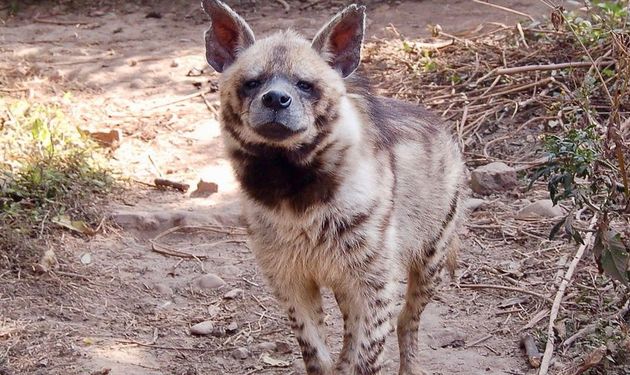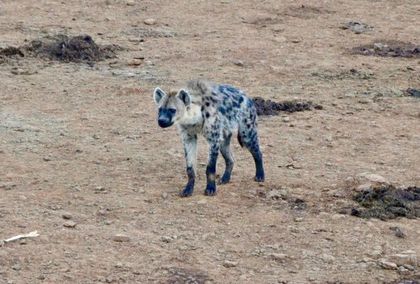The hyena was a common animal in the Holy Land in the Biblical era, and even today it can still be seen.

Hyenas will cry in its towers, and jackals in the pleasant palaces its time is close at hand and its days will not be prolonged. (Is. 13:22)
In most translations of the Bible, the word hyena only appears twice, both of them in the book of Isaiah (13 v 22 and 34 v 14).
The Hebrew term which has been translated as hyena, in keeping with the consistency of references in the Septuagint and parallelisms and analogies with Arabic and Rabbinic names for this wild animal, is cabhua.
In other places this same term appears as “wild beast” (Jeremiah 12:9 and the apocryphal Ecclesiasticus 13:18) but it also refers to hyenas. Likewise, the Hebrew word ciyyim, translated as “wild animals” (Isaiah 13:21) or “the creatures of the wilderness” (Psalm 74:14) could also refer to hyenas.
The hyena was a common animal in the Holy Land in the Biblical era, and even today it can still be seen. The species in question is the striped hyena (Hyaena hyaena), a carnivorous mammal belonging to the Hyenidae family, whose geographical distribution encompasses a large part of Africa, the Middle East, Turkey, Pakistan and even India.
In Europe it became extinct a long time ago. The hyena is about a metre long, and can weigh up to 40kg. Its colour is greyish brown with black diagonal stripes on its legs and vertical ones on the sides of its body.
Its front legs are slightly longer than its hind legs, and it has large erect ears which point forward.

One of the animal’s most striking features is the enormous power of its jaws. It can crush bones and tear the thick hide from the cadavers of the animals that it feeds on.
Occasionally hyenas desecrate tombs, grubbing into and unearthing human remains before devouring them. They are solitary animals which usually cluster during the breeding season and inhabit open forests, savannahs or deserts.
As it is a carrion animal that takes advantage of the prey hunted by other predators, fights with these animals (other hyenas, wolves, lions, cheetahs or leopards). Are inevitable, even though they are usually not to the death.
In India its main rival is the tiger and, from time to time they hunt tiger cubs when the mother is not around. On the other hand, the hyenas can also be the prey of other large felines.
More than four centuries ago, the English the English theologian Leonard Wright (1555-1591), wrote the following in a commentary on Psalm 55:
“His speech was smooth as butter, yet war was in his heart; his words were softer than oil, yet they were drawn swords. A false, feigning friend could be compared to a crocodile which, when it opens its mouth to “smile”, poisons, and when it sheds tears, devours; and to the hyena, with its human-like voice, but wolf-like behaviour, which speaks like a friend and devours like a demon; (…) to the flute or hunter’s horn, whose soft notes herald the death of the unfortunate bird; to the bee, which carries honey in its mouth and a sting in its tail; or to the ricin plant, with its lovely evergreen leaves and its lethally poisonous seeds. His outward appearance is friendly and words pleasing, but his intentions are sinister and actions polluting.” [1]
The evil reputation of the hyena has been the general rule since ancient times. Nevertheless, just like vultures and other carrion species, they play a vital role in the terrestrial ecosystems of this unique planet.
[1] Spurgeon, C. H. The Treasury of David.

Las opiniones vertidas por nuestros colaboradores se realizan a nivel personal, pudiendo coincidir o no con la postura de la dirección de Protestante Digital.
Si quieres comentar o